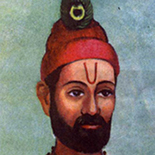 Kabir (c. 1440–c. 1518) was a mystic poet and saint of India. The name Kabir comes from Arabic al-Kabīr which means ‘The Great’ – the 37th name of God in Islam.
Kabir (c. 1440–c. 1518) was a mystic poet and saint of India. The name Kabir comes from Arabic al-Kabīr which means ‘The Great’ – the 37th name of God in Islam.
Kabir’s legacy is today carried forward by the Kabir Panth (“Path of Kabir”), a religious community that recognizes him as its founder and is one of the Sant Mat sects. Its members, known as Kabir panthis, are estimated to be around 9.6 million. They are spread over north and central India, as well as dispersed with the Indian diaspora across the world.
Kabir composed in a pithy and earthy style, replete with surprise and inventive imagery. His poems resonate with praise for the true guru who reveals the divine through direct experience, and denounce more usual ways of attempting god-union such as chanting, austerities, etc. Kabir, being illiterate, expressed his poems orally in vernacular Hindi, borrowing from various dialects including Avadhi, Braj, and Bhojpuri. His verses often began with some strongly worded insult to get the attention of passers-by.
Kabir and his followers named his poetic output as ‘bāņīs,’ utterances. These include songs and couplets, called variously dohe, śalokā (Sanskrit: ślokā), or sākhī (Sanskrit: sākşī). The latter term, meaning ‘witness,’ best indicates the use that Kabir and his followers envisioned for these poems: “As direct evidence of the Truth, a sākhī is… meant to be memorized… A sākhī is… meant to evoke the highest Truth.” As such, memorizing, reciting, and thus pondering over these utterances constitutes, for Kabir and his followers, a path to spiritual awakening.
ARE YOU LOOKING FOR ME?
Kabir
Are you looking for me?
I am in the next seat.
My shoulder is against yours.
You will not find me in stupas,
not in Indian shrine rooms,
nor in synagogues,
nor in cathedrals: not in masses,
nor kirtans,
not in legs winding around your own neck,
nor in eating nothing but vegetables.
When you really look for me,
you will see me instantly—
you will find me in the tiniest house of time.
Kabir says: student, tell me,
what is God?
He is the breath inside the breath.
=========
LOOK
Kabir
Look
what happens to the scale
when love
holds it.
It
stops
working.